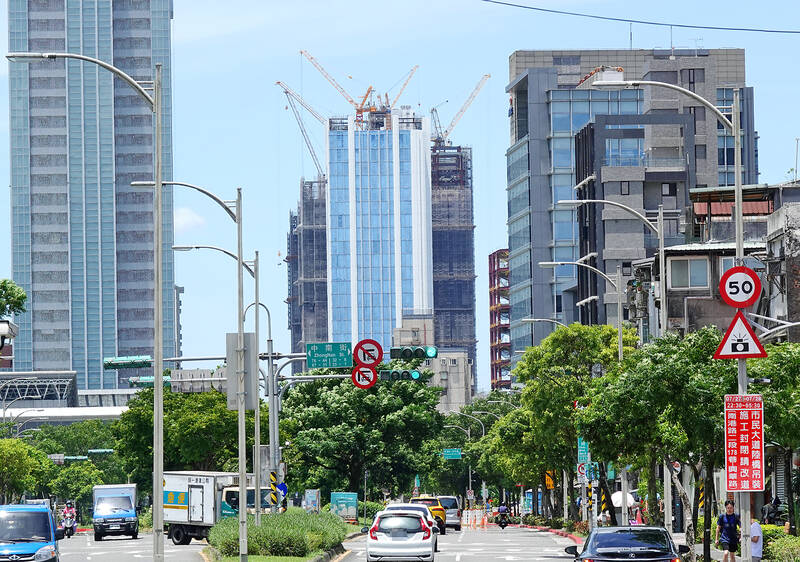Taiwan’s major property brokers yesterday reported a mild increase in housing deals this month, attributable mainly to the government’s introduction of preferential lending terms for first-home purchases.
Sinyi Realty Inc (信義房屋), Taiwan’s only listed broker, said the housing market’s performance this month was similar to July and last month, but gained 10 percent by volume compared with last year.
Singyi research manager Tseng Ching-der (曾敬德) attributed the year-on-year pickup to a low base last year.

Photo: CNA
“The third quarter proved not bad this time around, supported by real demand,” Tseng said, adding that people responded positively to the government’s introduction of ultra-low interest rates of 1.775 percent for first-home purchases.
The favorable lending terms also include a five-year grace period, a loan cap of NT$10 million (US$309,904) and mortgage periods of up to 30 years, significantly lowering the threshold for home ownership, Tseng said.
Specifically, houses priced from NT$10 million to NT$15 million gained noticeable popularity, accounting for 25 percent of deals, the analyst said.
Apartments valued between NT$30 million and NT$50 million in Taipei were also well received, whereas houses of NT$10 million to NT$20 million were the mainstream in New Taipei City, Tseng said.
Evertrust Rehouse Co (永慶房屋), Taiwan’s largest broker by number of offices, said it observed a small increase in housing deals across Taiwan, as people grew accustomed to policy measures the government adopted to cool the market.
The absence of new credit controls made by the central bank on Thursday last week allowed people to breathe a sigh of relief and speed up purchasing plans, Evertrust Rehouse deputy research head Chen Chin-ping (陳金萍) said.
People with relocation and asset allocation needs also took action after housing prices failed to show corrections for several quarters, Chen said.
H&B Realty Co (住商不動產), the nation’s top broker by number of franchises, said the market displayed better visibility compared with the two previous months and preferential lending terms played an encouraging role.
This was most evident for the two-bedroom apartments in northern and southern Taiwan, H&B Realty research chief Jessica Hsu (徐佳馨) said, adding that offices with rental prospects also received close attention.
Great Home Realty Co (大家房屋) said it did not detect cautious sentiment thus far, though the presidential and legislative elections are drawing near.
It is too early to conclude that political uncertainty does not matter at this time, Great Home head researcher Mandy Lang (郎美囡) said.

Nvidia Corp chief executive officer Jensen Huang (黃仁勳) on Monday introduced the company’s latest supercomputer platform, featuring six new chips made by Taiwan Semiconductor Manufacturing Co (TSMC, 台積電), saying that it is now “in full production.” “If Vera Rubin is going to be in time for this year, it must be in production by now, and so, today I can tell you that Vera Rubin is in full production,” Huang said during his keynote speech at CES in Las Vegas. The rollout of six concurrent chips for Vera Rubin — the company’s next-generation artificial intelligence (AI) computing platform — marks a strategic

Enhanced tax credits that have helped reduce the cost of health insurance for the vast majority of US Affordable Care Act enrollees expired on Jan.1, cementing higher health costs for millions of Americans at the start of the new year. Democrats forced a 43-day US government shutdown over the issue. Moderate Republicans called for a solution to save their political aspirations this year. US President Donald Trump floated a way out, only to back off after conservative backlash. In the end, no one’s efforts were enough to save the subsidies before their expiration date. A US House of Representatives vote

REVENUE PERFORMANCE: Cloud and network products, and electronic components saw strong increases, while smart consumer electronics and computing products fell Hon Hai Precision Industry Co (鴻海精密) yesterday posted 26.51 percent quarterly growth in revenue for last quarter to NT$2.6 trillion (US$82.44 billion), the strongest on record for the period and above expectations, but the company forecast a slight revenue dip this quarter due to seasonal factors. On an annual basis, revenue last quarter grew 22.07 percent, the company said. Analysts on average estimated about NT$2.4 trillion increase. Hon Hai, which assembles servers for Nvidia Corp and iPhones for Apple Inc, is expanding its capacity in the US, adding artificial intelligence (AI) server production in Wisconsin and Texas, where it operates established campuses. This

US President Donald Trump on Friday blocked US photonics firm HieFo Corp’s US$3 million acquisition of assets in New Jersey-based aerospace and defense specialist Emcore Corp, citing national security and China-related concerns. In an order released by the White House, Trump said HieFo was “controlled by a citizen of the People’s Republic of China” and that its 2024 acquisition of Emcore’s businesses led the US president to believe that it might “take action that threatens to impair the national security of the United States.” The order did not name the person or detail Trump’s concerns. “The Transaction is hereby prohibited,”